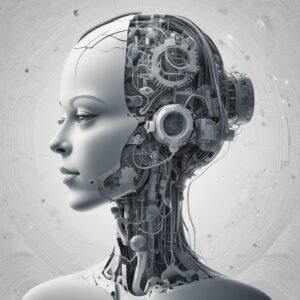Understanding Generative AI
Generative AI refers to a class of artificial intelligence systems designed to create original content, drawing upon existing datasets to produce new material. This technology is grounded in complex algorithms and advanced computational models that enable machines to mimic human-like creativity across various forms of media including text, images, music, and videos. The core mechanisms that underpin generative AI primarily include neural networks and machine learning techniques. These technologies work in concert to process vast quantities of data, identify patterns, and generate fresh outputs based on learned representations.
At its essence, generative AI leverages deep learning—specifically through architectures like Generative Adversarial Networks (GANs) and transformer models. GANs, for example, consist of two competing neural networks: a generator that creates new content and a discriminator that evaluates the authenticity of the generated content. This adversarial process yields high-quality outputs that often blur the lines between human and machine-generated creative works. On the other hand, transformer models, such as those employed in OpenAI’s ChatGPT and DALL-E, utilize attention mechanisms to better understand context and generate coherent sequences of text or high-resolution images from brief prompts.
In recent years, significant advancements in generative models have propelled the field forward. Technologies like ChatGPT have revolutionized text generation, while DALL-E and Stable Diffusion have introduced novel ways to create imagery from textual descriptions. These tools exemplify how generative AI can not only automate content creation but also enhance productivity and creativity for content creators across diverse industries. By harnessing these capabilities, professionals can streamline their workflows and innovate in ways previously thought unattainable, further blurring the lines between human and artificial creativity.
Impact on Content Creation Industries
The advent of generative AI technologies has significantly reshaped various content-creation industries, including marketing, entertainment, and education. By automating repetitive tasks, these tools allow creators more time to focus on strategic thinking and innovative ideas. In marketing, businesses are increasingly adopting generative AI to develop personalized content at scale. For instance, companies can generate tailored email campaigns or social media posts based on consumer behavior and preferences, thereby enhancing audience engagement and driving conversion rates.
In the entertainment sector, generative AI is transforming how narratives are crafted. Writers and directors leverage AI-driven platforms to create scripts, storyboards, and even character developments. This approach not only facilitates rapid prototyping but also encourages iterative design, enabling creatives to explore various scenarios without extensive resource investments. For example, Netflix has employed AI technologies to assess viewer preferences, which influences show development and enhances user satisfaction.
The educational landscape is also witnessing profound changes due to generative AI. Educators are utilizing these tools to create adaptive learning materials that resonate with individual learners. AI-driven platforms can analyze a student’s performance and generate customized quizzes or learning modules tailored to their needs. This approach fosters a more personalized learning experience, ultimately leading to improved educational outcomes.
However, the rise of generative AI is not without challenges. Concerns regarding copyright and originality may arise, especially when the output closely resembles existing works. Additionally, there is a risk that over-reliance on AI could stifle human creativity. Nevertheless, the opportunities presented by generative AI, such as efficiency, enhanced personalization, and innovative content generation, showcase its transformative influence across various content industries. As these technologies continue to evolve, their role in shaping the future of content creation will undoubtedly expand.
The Future of Content Creation with Generative AI
The landscape of content creation is poised to undergo significant transformation with the advancement of generative AI tools. As these technologies become increasingly integrated into various aspects of content production, we can expect to see an enhanced collaboration between human creators and artificial intelligence. This partnership may redefine traditional roles, allowing creators to leverage AI-generated insights to enhance their work while focusing on more creative and strategic aspects of the process.
One notable trend is the rising capability of AI to generate high-quality content autonomously. This might include text, images, or multimedia, which can be tailored to specific audiences based on robust data analytics. As a result, marketers and brands may find themselves utilizing AI not just as a support tool but as a primary source of original content conception. This shift raises critical questions about authorship, as AI-generated materials blur the lines of traditional ownership in the creative process. Who holds the rights to content produced by an AI? How should credit be attributed when human and AI contributions are intertwined?
Moreover, ethical considerations emerge when discussing the transparency of content creation. Educators, businesses, and content creators must navigate this evolving terrain thoughtfully. They will need to establish guidelines and frameworks that allow for the responsible use of generative AI technologies. This involves ensuring the integrity of the content produced, maintaining engagement with audiences, and fostering a clear understanding of AI-assisted creation methods.
Ultimately, the implications of these developments will be felt across various sectors, including marketing, education, and entertainment. As generative AI continues to evolve, content creators will be challenged to adapt, adapt workflows, and embrace new possibilities that these intelligent tools offer, potentially leading to a more innovative and engaging content landscape.
Challenges and Ethical Considerations
The rise of generative AI in content creation brings with it a myriad of challenges and ethical dilemmas that warrant thorough scrutiny. One of the primary concerns revolves around the quality and authenticity of AI-generated content. Despite advancements in machine learning algorithms, there remains a significant gap between human creativity and the ability of AI systems to produce genuinely innovative work. The nuances of human emotion, cultural context, and personal experience often elude AI, resulting in content that may lack depth or authenticity.
Furthermore, the risk of misinformation and bias in AI-generated content presents a critical challenge. Generative models learn from vast datasets, which may inadvertently contain biased information or inaccuracies. Consequently, there is a danger that AI can amplify these biases, perpetuating stereotypes and disseminating false information at an unprecedented scale. The implications are particularly troubling as such inaccuracies could influence public opinion, decision-making, and societal norms, making it essential for creators and consumers to recognize the potential pitfalls.
The impact of generative AI on traditional job roles in creative fields must also be considered. As AI tools become more sophisticated, there is a legitimate concern regarding displacement in professions traditionally reliant on creativity, such as writing, graphic design, and marketing. While some argue that generative AI can serve as an invaluable tool for enhancing creativity by assisting rather than replacing human creators, the underlying fear of job loss remains pervasive.
To address these complex issues, it is imperative to establish regulations and guidelines that promote responsible practices in the use of generative AI. Stakeholders must engage in thoughtful discussions about the ethical considerations inherent in this technology and develop frameworks that prioritize integrity and authenticity in content creation. Only through collaborative efforts can we harness the potential of generative AI while minimizing its adverse effects.




